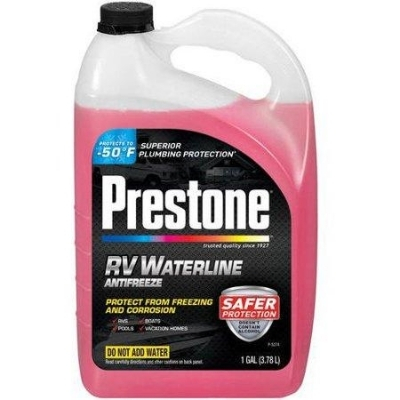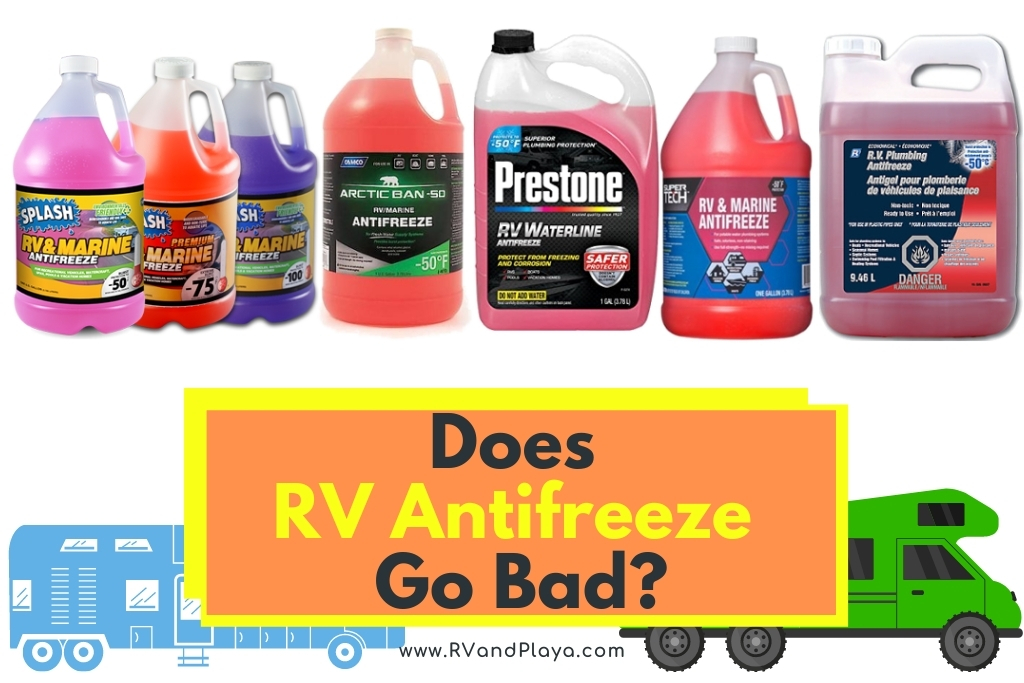Owning an RV can be one of the best ways to see the country. There are no many options for you to buy or rent one short term, but you have to be sure to take care of it.
RVs now come in luxury options and can sometimes be a better investment than a house. However, since it is like a mixture of a car and a home, there are many more things to worry about.
First of all, you have to make sure every piece is running appropriately, and this means learning about car pieces. All RVs need antifreeze to help them run properly.
Does RV antifreeze go bad and what is the shelf life of antifreeze? Typically, RV Antifreeze does not go bad. If it is closed properly, it should last between 1-5 years, and you can use it any time during that period. This can be a significant factor when keeping your RV running; more importantly, it will help keep the pipes in the home part running too.
However, RV antifreeze is different from the stuff you would put in a typical car. It can go bad after a year on the shelf; you will want to buy new antifreeze after that.
Read also: 5 Practical Ways To Unfreeze Water Lines In RVs (That Actually Work)
There are a few things that make RV antifreeze different from those of the automotive antifreeze, and you will want to be sure to buy the correct stuff.
It could lead to dangerous conditions if you mix them up because they’re meant for two entirely different mobiles. Owning an RV can be a lot of fun if you take care of it properly.
You will want to sit down and read the owner’s manual and go over everything with your mechanic before taking it on the road.
Table of Contents
How to Tell If RV Antifreeze is Bad or expired?
Once antifreeze is inside your RV premixed antifreeze can last from 1 to 5 years, and engine antifreeze doesn’t go bad or expire.
You can stock up and use it when you need to not needing to worry about when it will go bad.
However, if the label has a specific date on it, you should always listen to the label. If it is passed shelf life, it may not work as well.
One way you can test antifreeze is by putting it in the freezer; it should remain liquid form; if it turns to ice, it is bad and needs to be tossed out.
The Difference Between Car and RV Antifreeze
Not all antifreeze is meant for the same thing, and once you get into RVs, you will know there is a massive difference between coolants.
RV antifreeze is meant for the plumbing system; it moves around and helps flush things out without getting too hot or too cold. It helps your RV run and be homey

Automotive antifreeze can come in very toxic forms, whereas RV antifreeze is almost always non-toxic.
Automotive coolant cannot be used for anything else; it can only be put inside the engine, which is its sole purpose. It’s full of chemicals that, in no way, would help an RV perform better.
This sort of coolant can be toxic for us, and toxic for the environment. However, a car must have coolant, so we keep using it and buying it.
That can be a huge factor in wanting to travel by RV rather than by a car.
Read also: Can I Use My RV Toilet in the Winter or In Cold Weather (Yes, Here Is How)
Why Does An RV Need Antifreeze?
Antifreeze helps protect all the pipes in your RV. Before any sort of trip, you will want to grab a pink bottle of antifreeze; the color is how you know it is for an RV.
After buying it, you will want to pour it down all of the pipes. For instance, you will want to pour it in the sink drains of the kitchen, bathroom, the pipes in the shower, the toilet, and anywhere else.
This will help regulate the water, temperature, and keep your pipes running well throughout the RV. It is a crucial step.
As for the engine? If you keep the heat on, you will not need to add anything to those pipes. Some ducts run from the RV to the tank to keep those pipes regulated.
If you think you need antifreeze for your engine be sure to call the place where you bought it from or call a professional who is used to dealing with RVs.
Whatever you decide, do not use toxic antifreeze.
Related reading: How to Prevent Travel Trailer or RV Pipes from Freezing?
Where Do You Buy Antifreeze for Your RV?
The great news is you can buy antifreeze for RVs at almost any convenience store. It is pretty standard, but instead of looking for the green or yellow antifreeze, you will want to look for the bright pink bottle.
That is one way you can tell the difference between RV and automotive coolant.
You can also find options at most
No matter where you are in the country, you will find an easy and budget-friendly option if you need it.
I really like this Camco RV Antifreeze Concentrate. It’s not terribly expensive but gets amazing reviews. Just follow the link to Amazon where you can see current pricing.
Can a Regular Mechanic Look at Your RV?
An RV is a massive machine that acts like a home. A car is smaller, and when you take it to the mechanic, there is enough space to fit even a big truck.
However, a regular mechanic will not have enough space to deal with a large machine.
There are also different pieces inside of an RV engine than a car engine. You will need to find a mechanic who works with RV’s because they will have the space to cater to your machine no matter what the size is.
Is It Hard to Maintain An RV?
Generally speaking, you will need to do the standard auto work and maintenance to keep it running. In that regard, it is pretty easy to maintain.
However, washing it will be a huge chore, and keeping the insides clean will be another thing to have to worry about.
Owning an RV can be rewarding and exciting, but it does take work to own and maintain, especially if you don’t live in it full time.
Generally speaking, it costs $500 a year to manage the entire RV, which is much less than home maintenance and repairs.
Related reading: Renting an RV to Live In: Everything You Need to Know
Final thoughts
If you’re looking for a new RV, make sure you take your time when picking out the style and the brand. Every RV is different, and it will cost a different amount to maintain.
The excellent news is coolant should be the least worrisome and doesn’t need to be a thought until later.
You will want to negotiate the price and find one that you can afford. Buying an RV is a lot like buying a car, but there will be other things to look at.
Related reading: How to Choose the Right Size Travel Trailer: An In-Depth Guide
If you’re planning on selling your house and getting an RV, you will want to find one that is big enough, and you will probably need to find one with decent storage.
If you find one, but it has little to no storage, you will want to get a storage unit. These are just a few things to consider.
No matter how far you drive or only live in it part-time, you will need to maintain it. Antifreeze is necessary if you are going to live in it at all.
You will want to pour some down the drains before going on a trip, and you may even want a backup gallon while you’re on the road.
If you use it all, you should be able to stop at most places and find a giant pink bottle of antifreeze for your RV.
Does RV Antifreeze Go Bad or Expire? None of it should go bad for a long time in the bottle, and none of it should go bad once it hits your pipes.
Recent Posts
Is Toyota Remote Connect Free? (Subscription, Services Plans)
Does Toyota Remote Connect have an included trial? It used to be the case that, when you bought a new car, you made one straightforward payment and that was it. Now, it feels like there are...
Toyota Safety Connect: What It Is And Why You Need It? Whether you’re buying a new Toyota or you’ve had one for a while you will have been given the hard sell on their Connected Services but do...


